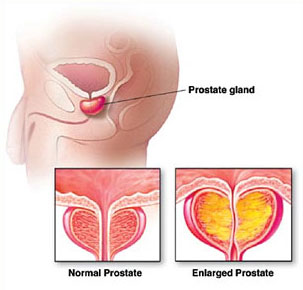Management of Enlarged Prostate

Generally, Benign Prostatic Hyperplasia (BPH) or prostate gland enlargement can develop in one out of every three men, who are 60 years and beyond. The enlargement is also a consequence of hormonal imbalances that take place as the aging process progresses. The expansion of the prostrate extrapolates into the urethra and obstructs the flow of urine, which in turn causes irritation and interruption in the functioning of the urinary bladder.
What are the symptoms of Enlarged prostate?
- Frequent urination especially at night
- Urgency to urinate with a weak and interrupted stream
- Incomplete emptying of the bladder
- Difficulty to begin the process of urinating
- Sudden stoppage of urination (acute urinary retention)
- Continued dribbling of urine
What are the complications?
When left untreated BPH can become complicated and these complications include:
- Acute urinary retention
- Passing blood in the urine
- Urinary tract infection
- Bladder damage
- Kidney damage
- Overflow incontinence and Kidney failure
Medical treatment
There is no permanent cure for BPH. However, there are two types of medications that are usually prescribed which focus on relieving the symptoms. It works in about 70% of the patients treated. Regular follow up is essential to ensure control of symptoms and checking for development of complications. Some groups of patients may not respond completely, to medical treatment.
When medical treatment does not work, the alternative treatment available is minimally invasive surgery. There are several types of minimally invasive procedures available. The various types of minimally invasive procedures used are “heat energy” processes that shrink a portion of the prostrate and these procedures have been effective.
Types of Minimally Invasive Procedures
Transurethral microwave thermotherapy or TUMT – this is a procedure for mild to moderate blockage in the urinary tract. The result of this procedure is that it reduces the frequency, straining, and urgent need to urinate and improves the flow from an intermittent flow. During this procedure, computer controlled microwave heat energy is used to destroy a select portion of the tissue in the prostrate. A cooling system protects the walls of the urethra from getting damaged.
Transurethral radio frequency needle ablation or TUNA – involves the heating up of the tissue in the prostrate with high frequency radio-waves that destroy the selected tissue. This procedure helps improve urination and symptoms.
Prostatic Stents – A tiny metal coil or stent is inserted into the urethra to widen the passage and to keep it open. This is an outpatient procedure and requires local anesthesia.
Who needs surgical treatment?
Patients who are unresponsive to medications and patients who develop complications are prime candidates for surgical treatment.
Before the advent of modern day techniques and technology, the Monopolar procedure, a type of resection of the prostrate, was used to surgically correct the disorder. This is an endoscopic procedure, which does not leave a scar. The monopolar instrument is specially designed to pass through the urethral passage, prostrate and bladder. In this endoscope procedure, electrocautery energy is used to remove the obstructive tissue. In some cases troublesome bleeding may occur, besides reducing sodium levels in the blood causing confusion and hypertension in the patient.
At Kauvery Hospital, prostrate surgery is done using the most modern technique, called BIPOLAR RESECTION. This instrument is a specially designed generator that provides energy to cut the prostrate and seal the bleeding (if any) at the same time. Consequently, there is virtually no bleeding during the procedure and with its specially designed enucleating loop, even very large sized prostrates can be downsized easily. The risks associated with the Monopolar type of instrument do not exist in the Bipolar Resection Instrument.
Diabetes & Benign Prostatic Hyperplasia (BPH)
In a Diabetic patient the bladder muscle contraction as well as bladder sensation is poor, compared to normal individuals. They can have difficulty in emptying urine and this goes unrecognized. They are prone to ‘overflow incontinence’. Both medical and surgery cannot provide any relief at this stage. Diabetic patients are advised to have prostate surgery early if medications are not effective, to avoid serious complication like overflow incontinence.
Article By Dr. N. Anandan, Senior Urologist & Andrologist
